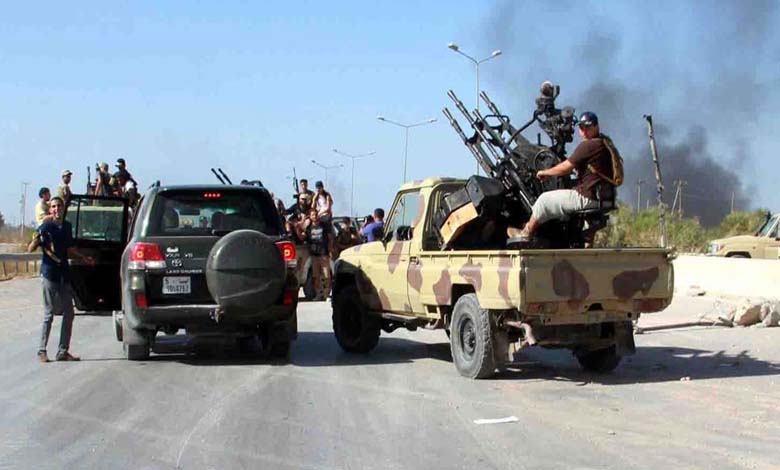Sabratah in Flames: Western Libya a Prize for Militias as the Non-State Prevails

On Monday evening, heavy armed clashes broke out in the city of Sabratah, western Libya, in yet another scene reflecting the chaos of militias and the uncontrolled proliferation of weapons in the country’s western region.
-
Where is Western Libya Heading? Open Scenarios for the Future of the Conflict
-
Political Stalemate Brings Militias in Western Libya Back into the Spotlight
According to a Libyan military source, the confrontations began in the Dahman area after an RPG struck a house belonging to a man known as “al-Kabo.” The incident escalated tensions and expanded the scope of the fighting, with explosions echoing across the city, particularly in the residential neighborhoods of al-Dourine.
The source confirmed that the clashes continued with live fire and shelling towards the valley, spreading panic among residents. Armed groups were seen in the alleys of Dahman, while locals appealed for the Red Crescent to intervene and secure safe passages to evacuate trapped families. The initial toll reported one dead, several wounded, along with destruction of infrastructure and civilian homes.
The source added that “so far, the real reason behind the outbreak of the clashes remains unknown.”
-
Western Libya Ablaze: Bloody Clashes Turn Streets into Warzones
-
Tension rises in Western Libya after assassination of one of the biggest human traffickers
A daily chaos
Military analyst Mohamed al-Tarhouni considered that Libyans have grown accustomed to the proliferation of weapons and recurring clashes, to the point that it has become part of the “daily routine.” He stressed that this phenomenon is a direct reflection of the security chaos plaguing western Libya.
Al-Tarhouni said that the expired Government of National Unity bears part of the responsibility by fueling these clashes to serve its own interests, or by fostering a chaotic environment that serves its objectives — similar to the armed mobilizations witnessed in Tripoli to ensure control over the capital.
-
A new wave of tension between eastern and western Libya threatens to undermine the political process
-
Violent clashes in western Libya – DETAILS
Government and militias
Al-Tarhouni emphasized that militia leaders view territories as “spoils” and assert their presence through armed looting and clashes, which deepens the cycle of chaos and pushes stability and elections further out of reach.
He underlined that the citizen is the main victim of this turmoil, pointing out that the negligence of state institutions — whether the Government of National Unity or security agencies — has contributed to the continuation of this phenomenon, even exploiting it for narrow interests, thereby reinforcing a culture of “non-state” in western Libya.
-
Escalating tensions… Airstrikes widen in western Libya
-
Less than half… Attacks deprive the majority of Libyan towns of voting
Persistent instability
The capital Tripoli and its surroundings are witnessing unprecedented tension amid sharp militia polarization, raising fears of a full-scale confrontation. The uncontrolled spread of weapons, which has plagued Libya since 2011, remains a major obstacle to any stability.
Military sources estimate that more than 29 million weapons remain outside state control, making armed attacks on civilians a recurring scene, especially in the west of the country dominated by militias with multiple allegiances.
-
Salvation Friday: Libyans Hold Their Breath Amid Fears of Militia Chaos
-
Libyan Expert: Dbeibeh’s Move Is Too Late… Militias Have Become Partners in Power
UN roadmap
These developments come as the United Nations mission in Libya, led by Hanna Tetteh, seeks to support the new roadmap announced on August 21. It is based on three pillars: drafting an electoral framework, unifying institutions through the appointment of a single government, and launching an inclusive national dialogue.
However, the escalation on the ground in western Libya threatens to derail these efforts and jeopardize the roadmap, amid growing fears that the clashes could extinguish any chance of reviving the political process.












